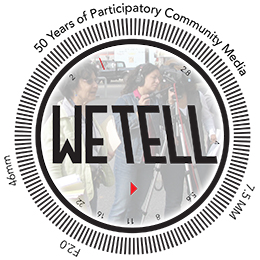
We Tell: Fifty Years of Participatory Community Media
We Tell Press
"We Tell allows a vast range of material to weave dense patterns of relation over space and time. Its six loosely thematic programs, each organized chronologically, mark one path through the 35 videos, but others are possible... That each piece seems to acknowledge and anticipate the others is a testament to the care with which the series was programmed, but also to the intersections and alliances inherent to the politics on view. There are no single-issue documentaries here. Each moves quickly and forcefully to connect the various facets of its primary subject to broader discourses, seeking the solidarity in which popular power resides. Hardly any of the works bear the names of single authors. More often, collectives are credited with production, sometimes leaving their phone numbers and URLs at the end for those who wish to get involved. READ MORE."
- Maxwell Paparella, Screen Slate
"Ithaca College’s own professor of screen studies, Patricia Zimmermann pulled together thematic programs of 41 short documentaries produced by 36 community entities from across the United States by over 90 makers called, We Tell: Fifty Years of Participatory Community Media. Programmed and curated collaboratively, Zimmermann and Louis Massiah of Scribe Video Center in Philadelphia have created a national traveling exhibition, chronicling the hidden histories of place-based documentaries that arise from specific locales, communities, and needs for social and political change. The project was supported by major grants from the National Endowment for the Arts, Just Films/Ford Foundation and the Independence Public Media Foundation. READ MORE."
- Nancy McCann, Ithaca College News
"Film has a unique strength for depicting reality. Documentary as a genre capitalizes on this in a way that grants it a tripartite power as artistic medium, ethnographic method, and channel for political activism. We Tell: Fifty Years of Participatory Community Media makes use of that last strength in particular, providing a platform for an extensive curation of community video projects preserved by the XFR Collective (pronounced “transfer”), a group of archivist-activists who work to preserve at-risk media. The curation is presented by the Film Studies Center and Arts + Public Life.
The first event in the series, States of Violence, was hosted by Jacqueline Stewart, professor of cinema and media studies at UChicago and director of Arts + Public Life; Louis Massiah of the Scribe Video Center and co-curator of We Tell: Fifty Years of Participatory Arts and Media; and Maira Khwaja, journalist at the Invisible Institute. The seven short documentaries focus on systems of violence and the forms of expression that communities produce in reaction to them. READ MORE."
- Adrian Rucker, The Chicago Maroon